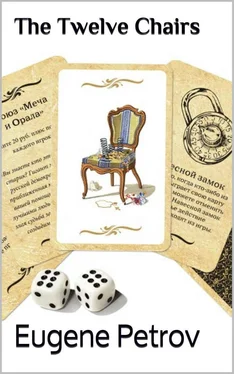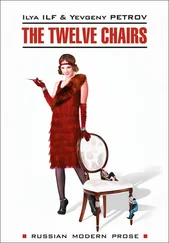Eugene Petrov - The Twelve Chairs
Здесь есть возможность читать онлайн «Eugene Petrov - The Twelve Chairs» весь текст электронной книги совершенно бесплатно (целиком полную версию без сокращений). В некоторых случаях можно слушать аудио, скачать через торрент в формате fb2 и присутствует краткое содержание. Год выпуска: 2013, Жанр: Юмористическая проза, на английском языке. Описание произведения, (предисловие) а так же отзывы посетителей доступны на портале библиотеки ЛибКат.
- Название:The Twelve Chairs
- Автор:
- Жанр:
- Год:2013
- ISBN:нет данных
- Рейтинг книги:5 / 5. Голосов: 1
-
Избранное:Добавить в избранное
- Отзывы:
-
Ваша оценка:
- 100
- 1
- 2
- 3
- 4
- 5
The Twelve Chairs: краткое содержание, описание и аннотация
Предлагаем к чтению аннотацию, описание, краткое содержание или предисловие (зависит от того, что написал сам автор книги «The Twelve Chairs»). Если вы не нашли необходимую информацию о книге — напишите в комментариях, мы постараемся отыскать её.
Find traces of a separate headset difficult and heroes face different adventures and troubles.
The Twelve Chairs — читать онлайн бесплатно полную книгу (весь текст) целиком
Ниже представлен текст книги, разбитый по страницам. Система сохранения места последней прочитанной страницы, позволяет с удобством читать онлайн бесплатно книгу «The Twelve Chairs», без необходимости каждый раз заново искать на чём Вы остановились. Поставьте закладку, и сможете в любой момент перейти на страницу, на которой закончили чтение.
Интервал:
Закладка:
backside.
"Good shot!" said Ostap, rubbing the affected part. "The hearing is
continued."
CHAPTER NINE
WHERE ARE YOUR CURLS?
While Ostap was inspecting the pensioners' home, Ippolit Matveyevich
had left the caretaker's room and was wandering along the streets of his
home town, feeling the chill on his shaven head.
Along the road trickled clear spring water. There was a constant
splashing and plopping as diamond drops dripped from the rooftops. Sparrows
hunted for manure, and the sun rested on the roofs. Golden carthorses
drummed their hoofs against the bare road and, turning their ears downward,
listened with pleasure to their own sound. On the damp telegraph poles the
wet advertisements, "I teach the guitar by the number system" and
"Social-science lessons for those preparing for the People's Conservatory",
were all wrinkled up, and the letters had run. A platoon of Red Army
soldiers in winter helmets crossed a puddle that began at the Stargorod
co-operative shop and stretched as far as the province planning
administration, the pediment of which was crowned with plaster tigers,
figures of victory and cobras.
Ippolit Matveyevich walked along, looking with interest at the people
passing him in both directions. As one who had spent the whole of his life
and also the revolution in Russia, he was able to see how the way of life
was changing and acquiring a new countenance. He had become used to this
fact, but he seemed to be used to only one point on the globe-the regional
centre of N. Now he was back in his home town, he realized he understood
nothing. He felt just as awkward and strange as though he really were an
emigre just back from Paris. In the old days, whenever he rode through the
town in his carriage, he used invariably to meet friends or people he knew
by sight. But now he had gone some way along Lena Massacre Street and there
was no friend to be seen. They had vanished, or they might have changed so
much that they were no longer recognizable, or perhaps they had become
unrecognizable because they wore different clothes and different hats.
Perhaps they had changed their walk. In any case, they were no longer there.
Vorobyaninov walked along, pale, cold and lost. He completely forgot
that he was supposed to be looking for the housing division. He crossed from
pavement to pavement and turned into side streets, where the uninhibited
carthorses were quite intentionally drumming their hoofs. There was more of
winter in the side streets, and rotting ice was still to be seen in places.
The whole town was a different colour; the blue houses had become green and
the yellow ones grey. The fire indicators had disappeared from the fire
tower, the fireman no longer climbed up and down, and the streets were much
noisier than Ippolit Matveyevich could remember.
On Greater Pushkin Street, Ippolit Matveyevich was amazed by the tracks
and overhead cables of the tram system, which he had never seen in Stargorod
before. He had not read the papers and did not know that the two tram routes
to the station and the market were due to be opened on May Day. At one
moment Ippolit Matveyevich felt he had never left Stargorod, and the next
moment it was like a place completely unfamiliar to him.
Engrossed in these thoughts, he reached Marx and Engels Street. Here he
re-experienced a childhood feeling that at any moment a friend would appear
round the corner of the two-storeyed house with its long balcony. He even
stopped walking in anticipation. But the friend did not appear. The first
person to come round the corner was a glazier with a box of Bohemian glass
and a dollop of copper-coloured putty. Then came a swell in a suede cap with
a yellow leather peak. He was pursued by some elementary-school children
carrying books tied with straps.
Suddenly Ippolit Matveyevich felt a hotness in his palms and a sinking
feeling in his stomach. A stranger with a kindly face was coming straight
towards him, carrying a chair by the middle, like a 'cello. Suddenly
developing hiccups Ippolit Matveyevich looked closely at the chair and
immediately recognized it.
Yes! It was a Hambs chair upholstered in flowered English chintz
somewhat darkened by the storms of the revolution; it was a walnut chair
with curved legs. Ippolit Matveyevich felt as though a gun had gone off in
his ear.
"Knives and scissors sharpened! Razors set!" cried a baritone voice
nearby. And immediately came the shrill echo;
"Soldering and repairing!"
"Moscow News, magazine Giggler, Red Meadow."
Somewhere up above, a glass pane was removed with a crash. A truck from
the grain-mill-and-lift-construction administration passed by, making the
town vibrate. A militiaman blew his whistle. Everything brimmed over with
life. There was no time to be lost.
With a leopard-like spring, Ippolit Matveyevich leaped towards the
repulsive stranger and silently tugged at the chair. The stranger tugged the
other way. Still holding on to one leg with his left hand, Ippolit
Matveyevich began forcibly detaching the stranger's fat fingers from the
chair.
"Thief!" hissed the stranger, gripping the chair more firmly.
"Just a moment, just a moment!" mumbled Ippolit Matveyevich, continuing
to unstick the stranger's fingers.
A crowd began to gather. Three or four people were already standing
nearby, watching the struggle with lively interest. They both glanced around
in alarm and, without looking at one another or letting go the chair,
rapidly moved on as if nothing were the matter.
"What's happening?" wondered Ippolit Matveyevich in dismay.
What the stranger was thinking was impossible to say, but he was
walking in a most determined way.
They kept walking more and more quickly until they saw a clearing
scattered with bits of brick and other building materials at the end of a
blind alley; then both turned into it simultaneously. Ippolit Matveyevich's
strength now increased fourfold.
"Give it to me!" he shouted, doing away with all ceremony.
"Help!" exclaimed the stranger, almost inaudibly.
Since both of them had their hands occupied with the chair, they began
kicking one another. The stranger's boots had metal studs, and at first
Ippolit Matveyevich came off badly. But he soon adjusted himself, and,
skipping to the left and right as though doing a Cossack dance, managed to
dodge his opponents' blows, trying at the same time to catch him in the
stomach. He was not successful, since the chair was in the way, but he
managed to land him a kick on the kneecap, after which the enemy could only
lash out with one leg.
"Oh, Lord!" whispered the stranger.
It was at this moment that Ippolit Matveyevich saw that the stranger
who had carried off his chair in the most outrageous manner was none other
than Father Theodore, priest of the Church of St. Frol and St. Laurence.
"Father!" he exclaimed, removing his hands from the chair in
astonishment.
Father Vostrikov turned purple and finally loosed his grip. The chair,
no longer supported by either of them, fell on to the brick-strewn ground.
"Where's your moustache, my dear Ippolit Matveyevich?" asked the cleric
as caustically as possible.
"And what about your curls? You used to have curls, I believe!"
Ippolit Matveyevich's words conveyed utter contempt. He threw Father
Theodore a look of singular disgust and, tucking the chair under his arm,
Читать дальшеИнтервал:
Закладка:
Похожие книги на «The Twelve Chairs»
Представляем Вашему вниманию похожие книги на «The Twelve Chairs» списком для выбора. Мы отобрали схожую по названию и смыслу литературу в надежде предоставить читателям больше вариантов отыскать новые, интересные, ещё непрочитанные произведения.
Обсуждение, отзывы о книге «The Twelve Chairs» и просто собственные мнения читателей. Оставьте ваши комментарии, напишите, что Вы думаете о произведении, его смысле или главных героях. Укажите что конкретно понравилось, а что нет, и почему Вы так считаете.












